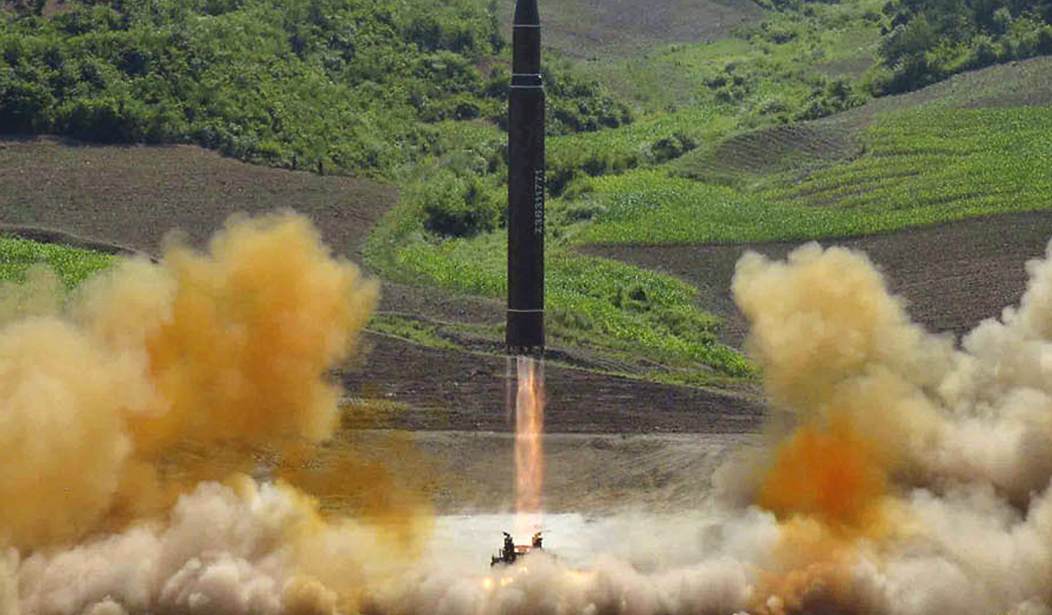Rocket engines may seem esoteric, something for scientists, engineers and policy wonks to worry about. But they are more than that: They are a near term worry for all Americans now, as North Korea continues to test missiles capable of hitting the United States. This is theory no more. The need to prevent proliferation of ICBM technology is immediate.
Last month’s New York Times headline read: North Korea’s Missile Success Is Linked to Ukrainian Plant, Investigators Say.” But there was more to it. North Korea shocked defense and intelligence officials with a break-out into heavy lift ICBM capability. The real question was, since they did not make it, where did they get it?
The answer, as the headline suggests, was outside North Korea. In reality, Russian-made rocket engines, in this case the RD-250 – whether made in Russia or Ukraine – appears to be the answer.
Both the Russian-made RD-180 engines, which America uses to launch our Atlas V rockets and the RD-250, implicated here – are heavy lift, Russian-made rocket engines.They are generally reliable, and until recently not sold abroad. They are the ultimate enemy of those seeking to prevent nuclear – or conventional – warhead delivery.
If not controlled by Russia, Ukraine or America, they are the ultimate enemy of ICBM non-proliferation. Put differently, if Russia or Ukraine cannot prevent the illicit sale of these rocket engines to countries like North Korea, the United States should be seeking to buy them.
Ironically, it was national policy to buy all the Russian RD-180 rocket engines, without limitation, until recently. Now, there are – in the name of targeted sanctions against Russia – limits.
Recommended
These should be promptly lifted, not to help Russia – but to prevent Russia or Ukraine from selling or allowing the theft of these engines, preventing them from getting to a black-market that apparently includes North Korea.
The sadness is that we could have stopped this, if there had been a stronger focus on prevention, on ICBM technology non-proliferation, especially by a quixotic, often myopic Congress. The reality is that these engines are not only valuable for US launches of satellites requiring “heavy lift,” since we do not yet have our own heavy lift engines, but permitting them to reach the black market is a double loss: Countries like North Korea can come into possession of them, and then directly threaten all Americans.
The way forward must be to lift limits on American purchases, stop the black market from gaining access to these heavy lift engines, and doing all in our power to immobilize the heavy lift Russian-made rocket engines that, by all appearances, have already reached North Korea. There may not be many, but one is too many.
As the New York Times reported, not only is North Korea now testing “an intercontinental ballistic missile that appears able to reach the United States” and affirming that this “was made possible by black-market purchases of powerful rocket engines” with a Russian or Ukrainian origin, but the future will be defined by what policy makers do now.
Specifically, “analysts who studied photographs of the North’s leader …inspecting the new rocket motors concluded that they derive from designs that once powered the Soviet Union’s missile fleet,” in order words heavy-lift engines that America should be able to take off the black market with our own purchases, locking others out.
Instead of demonstrating foresight, Congress has been feuding internally about how many heavy lift rocket engines made by Russia NOT to buy. This is the wrong premise. Even as we build our own engines, which may take several more years, we should be buying these heavy lift engines for two obvious reasons.
First, we can use them all – as they are highly reliable – to launch our own heavy payloads, from Atlas V rockets. Second, we can prevent the launch by North Korea of a devastating nuclear or conventional payload at America or our allies.
We can prevent war twice, first by continuing – as we long have in very limited numbers – to launch satellites to outer orbits via American rockets, using these same Russian engines. Second, we can prevent North Korea, Iran and others from launching horrific weapons at the United States with these same engines.
Common sense says, do this, do it now, and do it without limitation – get these engines, such as the RD-180 and RD-250 – in to US possession, and stop pretending that these engines are safely locked up. They are not, obviously.
The New York Times report cited former CIA Director Leon Panetta, from a CBS interview, saying: “The rapid nature of how [North Korea] has been able to come to that [ICBM launch] capability is something, frankly, that has surprised both the United States and the world.” IN essence, we have time to limit the damage, but should act now, not wait.

























Join the conversation as a VIP Member